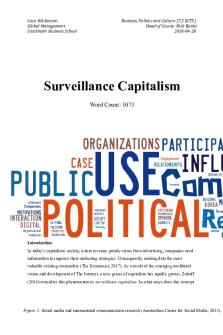Essay – The Committee and Capitalism PDF

| Title | Essay – The Committee and Capitalism |
|---|---|
| Author | Brandon Zitch |
| Course | World History |
| Institution | University of California Davis |
| Pages | 2 |
| File Size | 67.5 KB |
| File Type | |
| Total Downloads | 107 |
| Total Views | 145 |
Summary
Essay on The Committee and Capitalism...
Description
History 10C – A03 The Committee and Capitalism Son'allah Ibrahim is an Egyptian novelist and social critic whose satires are best known for their mixture of realism and dark humour. The Committee, his best-known novel, satirises Egyptian President Anwar El Sadat’s policy of ‘infitāh ḥ’, which liberalised and decentralised the economy, and opened Egypt to foreign investment. The open-door economic program was meant to encourage capitalist investment by domestic and foreign investors, thereby invigorating Egypt’s sizable and inefficient public sector. In The Committee, Ibrahim utilises satire to ridicule multi-national corporations and hidden authorities that have influenced Egypt in particular its political and economic systems. Ibrahim argues that the capitalist system is hegemonic and exploitive for third world countries. The committee members referred to in the title are a metaphor for multi-national Western corporations, with the nameless narrator-protagonist acting on the behalf of Egypt. Ibrahim manipulates his criticism of these corporations in such a way as to reflect capitalist domination over the third world nations. During the interview sequence with the committee, for instance, the protagonist is ordered to dance in the nude: ‘Do you know how to dance? … I took my necktie and wound it around my waist just above my hipbones, right where it would emphasise body’s flexibility’ (13). Having not been satisfied, the committee members then ordered him to take off his clothes. Ibrahim uses this scene as a way to reflect capitalist domination over third world nations, using the protagonist to represent Egypt. The protagonist is further dehumanised when he is ordered by a member of the committee to bend over to be examined during the interview. ‘Then he ordered me to bend over. I felt his hand on my naked buttocks. He ordered me to cough. At that moment I felt a finger inside my body’ (16). Ibrahim’s intention from this scene
was to expose the unsettling reality of the situation in Egypt by revealing the domination of Western capitalists over third world countries. Ibrahim ridicules Egyptian leaders of the time who facilitate the influx of Western companies and products into the country through the country’s open door policy, implied through the ‘bending over’ of the protagonist. The Committee also illustrates Ibrahim’s view that multi-national corporations are able to reduce nations into mere markets. ‘I suspect you agree with me, your honours, that the whole world uses these brand-name products. Just as the giant corporations producing them, in turn, use the world, transforming workers into machines, the consumers into numbers, and countries into markets’ (18). By comparing workers to machines, the protagonist suggests that people are dehumanised and are treated more like tools. In The Committee, Ibrahim chooses Coca-Cola as a representation of 20th century civilisation. Ibrahim critically unmasks the exploitation and the cultural impact of global capitalism on third world nations. Coca-Cola is used as a familiar symbol of the hypocrisy and the exploitative nature of such corporations. Ibrahim’s leftist and nationalist views are quite apparent through his portrayal of the unnamed protagonist in The Committee and his criticism demonstrates his subtle disapproval of globalisation and distaste for Egypt's totalitarian regime and police state. The Committee could be read as a standard Arabic text on the devastating effects of global capitalism on third world countries....
Similar Free PDFs

Balwantrai Mehta Committee
- 2 Pages

Surveillance Capitalism
- 8 Pages

Hagseed AND THE Tempest Essay
- 4 Pages

Vohra Committee Report 0
- 11 Pages
Popular Institutions
- Tinajero National High School - Annex
- Politeknik Caltex Riau
- Yokohama City University
- SGT University
- University of Al-Qadisiyah
- Divine Word College of Vigan
- Techniek College Rotterdam
- Universidade de Santiago
- Universiti Teknologi MARA Cawangan Johor Kampus Pasir Gudang
- Poltekkes Kemenkes Yogyakarta
- Baguio City National High School
- Colegio san marcos
- preparatoria uno
- Centro de Bachillerato Tecnológico Industrial y de Servicios No. 107
- Dalian Maritime University
- Quang Trung Secondary School
- Colegio Tecnológico en Informática
- Corporación Regional de Educación Superior
- Grupo CEDVA
- Dar Al Uloom University
- Centro de Estudios Preuniversitarios de la Universidad Nacional de Ingeniería
- 上智大学
- Aakash International School, Nuna Majara
- San Felipe Neri Catholic School
- Kang Chiao International School - New Taipei City
- Misamis Occidental National High School
- Institución Educativa Escuela Normal Juan Ladrilleros
- Kolehiyo ng Pantukan
- Batanes State College
- Instituto Continental
- Sekolah Menengah Kejuruan Kesehatan Kaltara (Tarakan)
- Colegio de La Inmaculada Concepcion - Cebu











